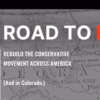In response to an election fraud conspiracy group’s door-to-door campaign seeking information from voters, the Colorado Secretary of State’s office issued a news release yesterday informing Coloradans of their civil rights and suggesting options for appropriate responses to the canvassers in order to protect voters’ privacy.
The Colorado Times Reporter first reported last month on a canvassing campaign by the United States Election Integrity Plan (USEIP), an election conspiracist group launched in Colorado to pursue unfounded claims of election fraud. In some cases, the USEIP canvassers are armed.
According to the Secretary of State (SOS), Colorado residents should be aware of their protected rights under federal and state laws, and know that these activities are in no way sanctioned by state authorities.
The Colorado SOS also released instructions for reporting inappropriate or unlawful actions exhibited by the canvassers to law enforcement.
1. If an individual comes to your door and requests information about your voting history or registration status, you are not required to answer.
2. Every voter’s right to a secret ballot is constitutionally protected in Colorado. If a door-to-door canvasser asks how you voted in a particular race, you are not required to tell the canvasser how you voted.
3. Any claim that door-to-door canvassing is official business of the Colorado Secretary of State’s office or the state of Colorado is false. No state or local election office in Colorado is conducting door-to-door voter participation surveys.
4. You have the right to request the name and credentials of door-to-door solicitors, as well as the organization they represent.
5. If you feel harassed or threatened, please reach out to local law enforcement or the Department of Justice at civilrights.justice.gov.
Some of the personal information provided in voter registration documents and election records is available as public records — accessible upon request from the Secretary of State’s website or provided by County Clerks.
However, other confidential information provided by a registered voter is not publicly available.
Confidential voter information includes social security numbers, birthdates, signatures, email addresses, and driver’s license numbers.
By law, how an individual voted in any given election and their identifiable ballot information are secret and protected.
In Colorado, registered voters who believe they might be subject to harassment or bodily harm due to the availability of their public voter information can apply for designation as a confidential voter by filling out a form with a county clerk’s office and paying a $5.00 fee.
Some Coloradans who are survivors of domestic violence, sexual offenses, or stalking can further protect their personal information through the Colorado Address Confidentiality Program.




